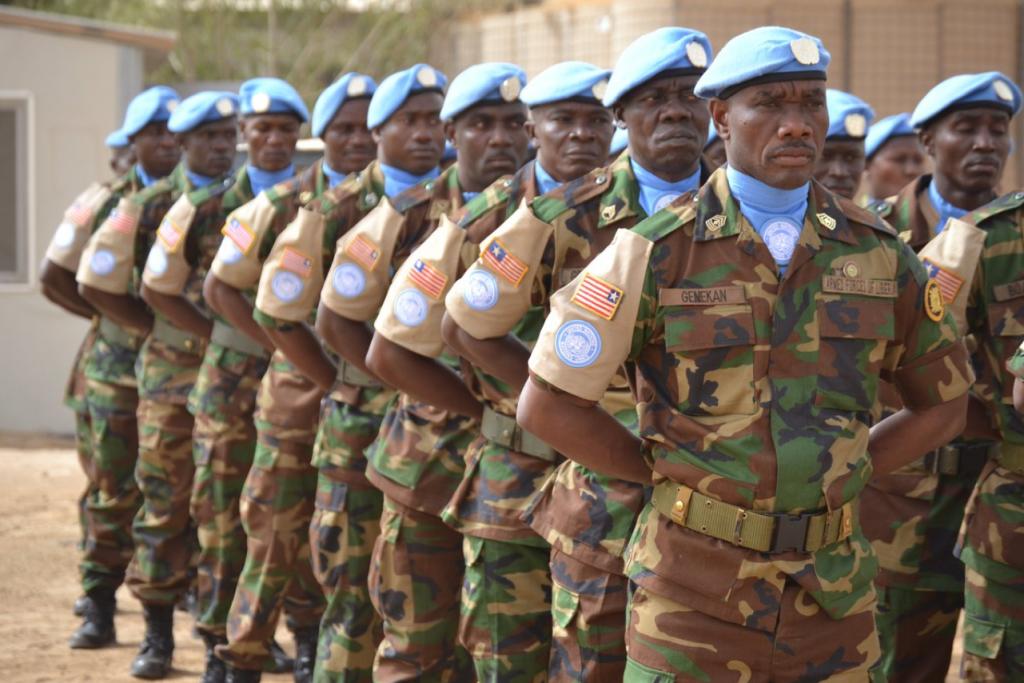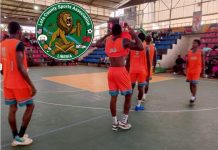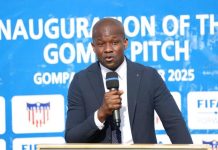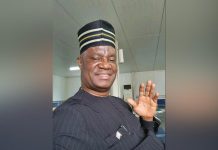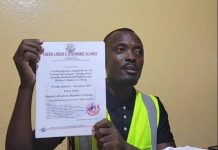Africa-Press – Liberia. Introduction
Since the conclusion of the war, the Armed Forces of Liberia underwent a massive overhaul. This was necessary because at points during the war, the AFL was basically a warring party to the conflict. The joint efforts of the AU, ECOWAS, US and other foreign donors pumped in millions into creating a professional, but small armed forces. of 2000 strong.
In 2003, the process began with the disarmament, demobilization and deactivation of the 100,000 combatants (including the old AFL and Rebel forces) disarmed under the Accra- Comprehensive Peace Accord. They then began building a new Liberian army of about 2,000 from scratch.
The United States took the burden of training the new national Liberian army, the responsibility being subcontracted in 2005, to DynCorp and PA&E, two private firms that work in coordination with the US military personnel. According to the State Department, the training package is estimated to cost around $95 million, which was drawn from a combination of International Disaster and Famine Assistance, Regional Peacekeeping, Foreign Military Assistance funds. DynCorp was responsible for individual training and PA&E was responsible for unit training. Liberian candidates had to pass a psychological examination; literacy test, and aptitude test. They were also given background checks, and tested for HIV.
The activation of the armed forces is under the guidance and regulation of Liberia’s 2008 National Defense Act. In 2008 Liberia’s Ministry of National Defense Act set a goal of having 2,000 trained soldiers by 2010. The AFL started a recruitment process which was opened to all qualified personnel ages 18-35 years old. Recruits must be clear of human rights abuses or violations. The minimum service length to serve is five years. It then exceeded that goal by nearly 200 soldiers. The total strength of the armed forces was 2,133 service members.
The activation ceremony of the first three companies; Alpha, Bravo and Charlie, constituting the First Battalion of the 23rd Infantry Brigade of the restructured Armed Forces of Liberia was held on Wednesday, 19 December 2007 at the Barclay Training Center (BTC) in Monrovia.
Leadership of the AFL
As of 2014, the AFL consists of two infantry battalions, a service company, a military police company, a Logistics command, and the Liberian National Coast Guard. For several years after the war, a Nigerian army officer served as head of the armed forces. After President Weah was elected, Prince C. Johnson III was promoted to Major General and became the new Chief of Staff while Geraldine George, became the Deputy Chief of Staff and got promoted to Brigadier General.
The new AFL emerged as a professional army, “modeled on the US army doctrine that will support the national objectives of the Government of Liberia”. It was structured after its US counterpart.
Navy
The Coast Guard was reactivated on the 53rd Armed Forces Day on February 11, 2010, with an initial strength of 40 persons who had been trained in the United States. A detachment from SeaBea Naval Mobile Construction Battalion 7, based at Naval station Rota, Spain, constructed a United States Africa Command funded boat ramp and concrete perimeter wall for the Coast Guard, which was handed over in December 2010. In February 2011, the United States turned over two donated USCG Defender class boats to the Coast Guard.
The First Engineering Company
Military engineers all over the world are tasked with the wartime role of mobility, counter mobility and survivability in support of all other arms of the armed forces. In peacetime, they are actively involved in increasing infrastructure and national development. Accordingly, since its activation in 2017, the first Engineering Company has continuously supported other arms of the Armed Forces of Liberia and the Government of Liberia in infrastructural development. In its civil outreach, Engineers of the AFL have rehabilitated some critical bridges along the main road leading to Todee District, which is historically noted for its flourishing economic activities in agriculture and trade.
Continual Training Exercises of the AFL
Personnel of the AFL, for the first time have converged in Northern Michigan, United States of America, for an annual war simulation training exercise known as Northern Strike. The 16 personnel drawn from the AFL’s Quick Reaction Platoon of its next batch of troops to be rooted in Mali left Liberia on Sunday, July 25, 2021 to join military personnel from all over the United States, United Kingdom, Latvia and Taiwan for Northern Strike.
Members of the AFL have begun new 7-week training programme in Explosive Ordnance Disposal. UNMAS is boosting the capacity of national security agents to respond to the threat of Explosive Remnants of war, of which an average of two are found each week in Liberia.
The Armed Forces of Liberia Peace Operation in Mali and Sudan
Within seven years of its restructuring, the new AFL was into International Peace Support Operations (PSO) in June 2013 under the African-Led International Support Mission to Mali (AFISMA) and later transition to United Nations Multidimensional Integrated Stabilization Mission in Mali (MINUSMA) in July 2013. The new AFL has conducted six successful rotations in Mali and has extended its PSO to Sudan and South Sudan. This rewarding because within nearly 15 years of existence, Liberia is currently supporting the international efforts through PSO within 3 countries (Mali, Sudan and Sudan).
Since the deployment of AFL contingent in Mali, “there have been demands from the UN to increase the size of the Liberian troops in Mali due to the outstanding performance of the AFL contingent in its duties,” It has been reported that the contingent is doing well. However, it faces some major logistical constraints and other challenges. For example, there are not adequate housing facilities, the relatively low salary, a need for better pension benefits, educational opportunities, etc.
Conclusion
The new AFL is an evolving and developing organization. It’s unofficial motto is “Building a force for good”. This is a story of success and pride to Liberia. It has shown that Liberians can do anything they set themselves to do.
A few Recommendations for the government are, that they increase budgetary support to the AFL in order to address their logistical constraints, social and financial challenges. That the GoL restructure the salary scheme of the AFL. That the GOL do more lobby to increase the number of men and women serving foreign missions, as they have brought pride to the nation. This is a good moral boost for the men and women in the service.
For More News And Analysis About Liberia Follow Africa-Press

